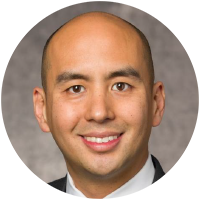Cristina Rodriguez, MD, is a medical oncologist at the Fred Hutchinson Cancer Center/University of Washington specializing in the treatment of head and neck cancers. She is the 2022 Cancer.Net Associate Editor for Head and Neck Cancers. Natalie Uy, MD, is a hematology and oncology fellow at the Fred Hutchinson Cancer Center/University of Washington. She is interested in the research and treatment of thoracic, head, and neck cancers. You can follow Dr. Rodriguez and Dr. Uy on Twitter. View disclosure information for Dr. Rodriguez. Dr. Uly has no relevant relationships to disclose.
Head and neck cancers refer to several cancers that develop in the lining of the mouth, tongue, throat, or voice box. The location of these cancers can often lead to physical symptoms, including changes in appearance, pain, speech impairment, difficulty swallowing, and breathing problems. Head and neck cancer can also add a significant emotional burden to the person with cancer and their family.
For some people with advanced head and neck cancer, there may come a time when treatment is no longer helping to manage the cancer. In these situations, the person’s care becomes focused on helping them have the highest quality of life possible. This is called hospice care, and it is used when a cure is not likely or when a person is in the last months of life. Through hospice care, people with cancer receive palliative care, also called supportive care, to help prevent or relieve cancer symptoms.
People with advanced head and neck cancer who are reaching the end of life may experience several unique challenges. Here, we describe what those challenges are and what caregivers can do to help address them, working closely with the patient’s medical care team, including palliative care and hospice care specialists.

“Supportive and palliative care specialists, as well as hospice care specialists, are experts in the area of symptoms management. It is never too early to have them onboard as part of your team so you can maximize the quality of life for your loved one.” – Richard T. Lee, MD, clinical professor in the Departments of Supportive Care Medicine and Medical Oncology at City of Hope Comprehensive Cancer Center and the 2022 Cancer.Net Associate Editor for Palliative Care
1: Nutrition problems
Weight loss is common in people with advanced head and neck cancer. It can be caused by many different factors, including appetite loss; nausea and vomiting; difficulty or pain with swallowing; increased metabolism from cancer, called cachexia; and other side effects from cancer treatment.
For people with cancer experiencing weight loss, doctors often recommend high-protein, high-calorie, nutrient-dense foods along with oral nutritional supplements. Meeting with a dietitian can be helpful to maximize the nutrition and calories your loved one may receive. Working with a speech and swallow therapist can also help your loved one improve their swallowing and reduce the risk of choking.
People with cancer and their families sometimes ask about nutritional support through a feeding tube or intravenous (IV) tube. Nutritional support with a feeding tube may benefit some people, such as those with an earlier stage of head and neck cancer who are going through treatment for a cure. As such, some people with more advanced head and neck cancer may already have a feeding tube that was previously placed that can be used for nutrition supplementation. However, new placement of feeding tubes and IVs in people with very advanced cancer is not typically recommended, as multiple studies have shown it can increase the risk of complications, such as infection. Furthermore, these measures have not been shown to improve a person’s survival or quality of life.
Although it can be distressing for family members to see their loved one not eating or drinking normally, it is important to remember that this is expected as a person reaches the end of life. Working with your loved one’s palliative care and hospice care specialists can help ensure that they are comfortable and that you have the support you need to cope with these expected changes.
2: Oral care issues
Oral examination and oral hygiene are important measures for people with advanced head and neck cancer to avoid mouth problems. There are many causes of mouth problems in people with cancer, including dry mouth, called xerostomia; side effects from chemotherapy or radiation therapy; side effects from other medications; the cancer itself; and poor hygiene due to weakness and fatigue. Some of the more common mouth problems in people with head and neck cancer include dry mouth, mouth sores, debris in the mouth, bad breath, ulcers, tooth decay, and oral thrush, all of which can impact a person’s quality of life. Oral symptoms can also lead to worsening food and drink intake, dehydration, pain, and difficulty in speech and communication.
If you are caring for a loved one with advanced head and neck cancer, giving them frequent small drinks or ice chips, saliva replacements, or oral moisture spray can help keep their mouth moist and clean. You can also apply gel or balm if they have dry lips. Gently clean their teeth and tongue with a soft dental brush or oral foam sticks. For people with dentures, remove the dentures at night, soak them in cleaning solution, and rinse and brush the dentures before putting them back into your loved one’s mouth. Significant weight loss can affect how dentures fit, so a good fit should be checked regularly. Medications can also help decrease drooling from excessive saliva. Give oral care when your loved one is semi-upright, if possible, to minimize the possibility of choking.
3: Pain
Pain is common in people with advanced head and neck cancer. It can be caused by the cancer itself or treatment side effects from surgery, radiation therapy, or chemotherapy. It is important to discuss any new symptoms or a change in symptoms with the health care team. They can manage pain with medications or other pain relief methods.
Pain treatments that do not use medications include physical therapy, massage, relaxation techniques, and exercise. Hot and cold compresses, ice packs, and heating pads can also help. If a person is receiving medication to relieve their pain, non-opioid pain relievers are usually recommended as the first option for mild to moderate pain. Meanwhile, opioids are an option for those experiencing moderate to severe pain.
For people who are able to swallow, oral opioids that are short- or long-acting can be helpful. Morphine and oxycodone are common types of oral opioids. For people who cannot swallow or need additional pain control, fentanyl skin patches may be an option. At times, it may also be possible for a person with advanced cancer to receive pain medications through an IV if oral medications or skin patches are not effective. These are generally provided by hospice care specialists.
Important side effects for caregivers to monitor when their loved one is on opioids include constipation, nausea, sedation, confusion, and breathing problems. Some people worry about side effects or that their loved one may experience addiction. Always talk with the medical team about the safest plan for managing your loved one’s pain.
Other types of medications, such as antidepressants and antiseizure medications, can help with nerve pain. Several states have approved the use of medial cannabis, also called marijuana, and cannabinoids for chronic pain. However, the data around its use is limited.

“Caregivers may face emotional, social, physical, functional, and financial challenges as they address the needs of a loved one diagnosed with advanced cancer. Self-compassion, self-care, and seeking support from family, friends, and the oncology team may aid with coping during this journey.” – Fay J. Hlubocky, PhD, MA, licensed clinical health psychologist and healthcare ethicist at the University of Chicago Medicine and the 2022 Cancer.Net Associate Editor for Psychosocial Oncology
4: Breathing problems
Feeling short of breath can be very distressing for people with head and neck cancer. Some ways to help relieve shortness of breath include increasing airflow with a fan directed at the face, using a humidifier, changing the positioning of your loved one, or using supplemental oxygen. Some people may find breathing exercises, meditation, or physical therapy helpful. Opioids are often given for shortness of breath; benzodiazepines, steroids, and bronchodilators are less common, but they may be options in certain circumstances.
Some people with head and neck cancer may have a tracheostomy placed due to the tumor blocking the airway, swelling, or side effects from cancer treatment. A tracheostomy is a surgical procedure to open the windpipe, called the trachea, to make it easier for the person to breathe. A person breathes through a tracheostomy tube instead of their nose and mouth. However, a tracheostomy makes it difficult for the person to speak, and a tracheostomy is not commonly recommended when a person is at the end of their life. Patients at the end of their life with a tracheostomy often require special care. Palliative care teams can help people with cancer and their families find the relief that best suits their goals.
5: Mental health problems
Distress and grief are common and normal responses to an advanced cancer diagnosis. People with head and neck cancer are at an increased risk of anxiety, depression, and fatigue. Functional impairments, like speech, swallowing, and eating problems, as well as changes in one’s appearance may lead to social stigma, isolation, and psychological symptoms, such as problems with body image, mood, and memory. Suicide rates among people with head and neck cancer are also among the highest of all cancer types.
Screening questionnaires for depression, anxiety, fatigue, and function given by the medical care team can help identify any mental health problems and psychosocial needs in people with advanced head and neck cancer. Even if a person is not diagnosed with a specific mental health problem, such as major depression, they can still benefit from medical and psychosocial interventions to reduce their suffering. Once identified, mental health symptoms can be treated by the health care team. Counseling, psychotherapy, medications, exercise, and integrative or complementary therapies are some options for treating mental health symptoms.
It is also important for caregivers to take care of their own mental health while caring for a loved one with cancer. In fact, a caregiver’s well-being is vital to the well-being of their loved one with cancer. Learn more about the importance of taking time to care for yourself during cancer caregiving.
Head and neck cancers can cause many challenging physical and emotional symptoms during the end of a person’s life. It is important to recognize that there are ways to relieve these symptoms. Never hesitate to reach out to your loved one’s health care team to ask about these options. Remember that you or your family member do not have to face these challenges alone. The health care team is there to help and can make a big difference in reducing your and your loved one’s suffering.







